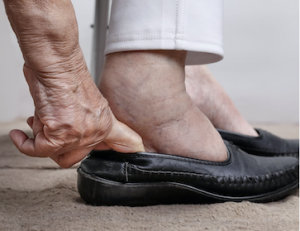How to invite healing joy into your senior’s room
Does your senior’s nursing home room feel depressing? Did the balloons deflate and the flowers die after a day in the hospital? Does their room in the assisted living facility still look kind of generic even after adding a few photos on the bedside table?
If you feel that way walking in, think how they feel living there.
Sometimes we hesitate to decorate, giving these excuses:
- My senior won’t be in this room very long.
- The facility restricts what we add to the walls or room.
- I don’t want personal items to get in the way of medical staff and equipment.
Overcome your internal excuses and create an atmosphere for healing and joy, even in a nursing home or assisted living facility!
Choose one of these simple products and ideas to transform your senior’s room.

- Removable “sweet dreams” decal on the wall in front of the bed wishes them good night
- Huge paper flowers/decals or removable potted plant decals (these don’t need water) fill a space
- Make a custom placemat with photos of people they love to use on a tray or at the table
- Inspire conversation with this “Who I Am” poster and hang it with damage-free wall clips
- Wall mounted or desktop adjustable sunlight lamp may improve the mood
- Have a photo blanket made, even just lap size
- Put up a suction cup window-mounted outside bird feeder
- Put up sparkle lights around a window or door frame
- Set up a digital picture frame with rotating pictures
- A diffuser with essential oils offers aromatherapy and a warm light. (Not recommended for shared room situations.)
- Tack a beautiful poster on the ceiling above their bed. This scene makes you feel as though you are laying in a forest looking up through the trees on a sunny day.
- Hanging a quilt on a wall can fill a big blank space and helps create a cozy atmosphere. These quilt hangers attach with removable adhesive strips
- The management of a real fish tank is too much, but can be relaxing, so why not try a lamp/virtual ocean fish tank?
- This temporary stick-on wall quote is a reminder to spread joy
- Window suction plant pot brings the outside in
- Rugs are trip hazards, but these peel and stick tiles can look like a rug.
Consider some of the benefits of temporary decorating:
- Gives you something to do “together.” Bring some paint chips and ask which colors they like. Psychology Today says, “Some colors, like shades of yellow, are like the sunshine. They can boost one’s mood and create a sense of optimism. Shades of blue can be calming. Others, like red or a secondary color such as orange, can be jarring.” Use those colors as you choose decorations. Or ask them which quote they like better for their temporary decal or about their favorite pictures for the lap blanket.
- Becomes a conversation starter for staff or visitors.
- Creates a welcoming atmosphere. If the decor makes staff and visitors smile, that brings more joy to your senior’s room.
Decorating your senior’s room fills it with personalized brightness and joy. Even if you just choose one of the items above, it can have a compounding effect, which is needed in a nursing home, hospital or assisted living facility.
Want other gift ideas for your senior? Check out these 7 thoughtful presents.
Debbie McDonald is the Founder of Ways & Wane, an online platform that helps you help your aging parent. She lives in Northern California with her husband.




 He careened around the grocery store aisles driving the scooter they provided. I followed, picking up fallen cans and apologizing to shoppers who jumped out of his way.
He careened around the grocery store aisles driving the scooter they provided. I followed, picking up fallen cans and apologizing to shoppers who jumped out of his way.